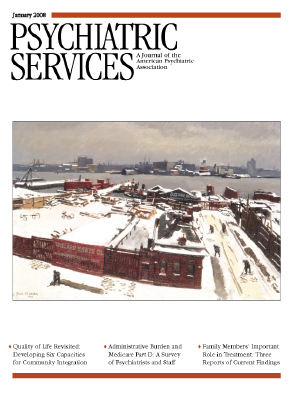The lack of evidence-based research available to guide clinicians in treating people with geriatric mental illnesses is striking. This is very much the case with regard to late-life bipolar disorder. Contrary to the popular notion that bipolar disorder "burns out" over time, this condition is becoming increasingly prevalent among elderly people as this segment of the population grows. Martha Sajatovic from Case Western Reserve University and Frederic Blow from the University of Michigan, two leaders in this burgeoning field, fill a gaping void with their book Bipolar Disorder in Later Life . Sajatovic and Blow recruited many experts and colleagues in geriatric bipolar research to create a comprehensive, cohesive, and crisply written work. This text will be of significant value to any clinician caring for this population, including general and geriatric psychiatrists, as well as geriatricians at all levels of training and expertise.
The editors' stated purpose is to "present the most up-to-date knowledge available, provide frameworks and resources with which to understand bipolar disorder in late life, and offer guidance to address the paucity of data on this topic." This purpose is achieved in an eminently readable manner, because the book is divided into four parts. In the first section, the editors introduce us to the epidemiology and assessment of late-life bipolar disorder. This is followed by a concise synopsis of the use and utility of mood-rating scales in assessing mania in geriatric bipolar disorder, provided by Robert Young and colleagues.
The second section concentrates on the treatment of late-life bipolar disorder, beginning with a summary of the different presentations of mania seen among elderly persons. The authors review the limited data that exist on the biological treatment of late-life bipolar disorder. Indeed, to date there has not been a single placebo-controlled trial of any agent in this population. Nevertheless, the authors do an excellent job of piecing together the available information to provide a framework for clinicians to treat geriatric bipolar disorder, focusing on minimizing potential adverse effects. The rest of this section includes valuable chapters on psychosocial interventions and treatment adherence.
The third section focuses on the many challenges of treating geriatric patients with bipolar disorder with active substance abuse and medical comorbidities. Helen Kales provides a useful and clearly written summary of the various medical conditions that often accompany the presentation of late-life bipolar disorder. This section concludes with a timely and interesting account of how culture may affect the diagnosis and treatment of bipolar disorder among elderly persons.
Among the concluding chapters is a review of the significant obstacles that researchers face in filling the gaps that remain in geriatric bipolar research and care. The reader is made aware of the uneven quality of psychiatric and medical care in this special population and the dearth of adequate quality control indicators to assess these issues.
Bipolar Disorder in Later Life is an exceptionally well-written and thorough review of this emerging focus of research. Both clinicians and academicians will find it to be a necessary and useful work in its own right, and we hope that it leads to continued advances in the field.

